
Latest News Regarding
Horn of Africa
Ethiopia rejects US claims of ethnic cleansing in Tigray
Ethiopia rejects US claims of ethnic cleansing in Tigray



Source: Xinhuanet, Sunday March 14, 2021
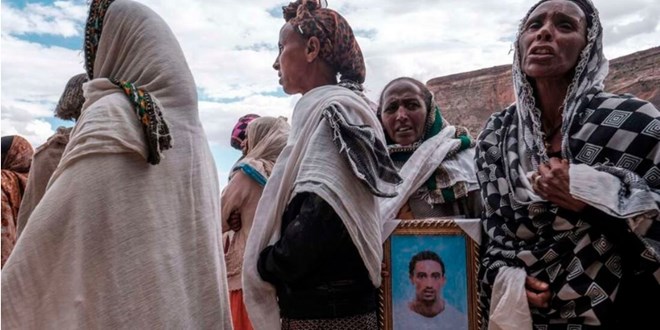
The Ethiopian government on Saturday rejected US allegations of ethnic cleansing in the northern Tigray regional state as “completely unfounded”.
“(The accusation) is a completely unfounded and spurious verdict against the Ethiopian government,” the Ethiopian Foreign Ministry said in a statement, referring to allegations made by US Secretary of State Antony Blinken earlier in the day in a congressional hearing.
“Overblowing things out of proportion while the Ethiopian government has made its position unequivocally clear on the need for thorough investigation in collaboration with regional and international partners does not serve the purpose of justice other than unnecessarily politicising the issue,” the statement said.
Thousands dead
Months of fighting between the Tigray People’s Liberation Front, which used to rule the Tigray regional state, and the Ethiopian National Defence Forces, have reportedly left thousands of people dead, hundreds of thousands of others displaced, and millions in urgent need of humanitarian assistance.
According to Ethiopian government figures, the conflict has displaced around 2.2 million people, while 4.5 million people are in need of emergency aid.
The Ethiopian government has recently allowed humanitarian access to Tigray, stressing that all entities operating in the state should abide by the laws of the land.
UPDATE: Kenya pulls out of maritime case with Somalia, cites bias and COVID-19 impact
UPDATE: Kenya pulls out of maritime case with Somalia, cites bias and COVID-19 impact




Source: Hiiraan Online, Sunday March 14, 2021
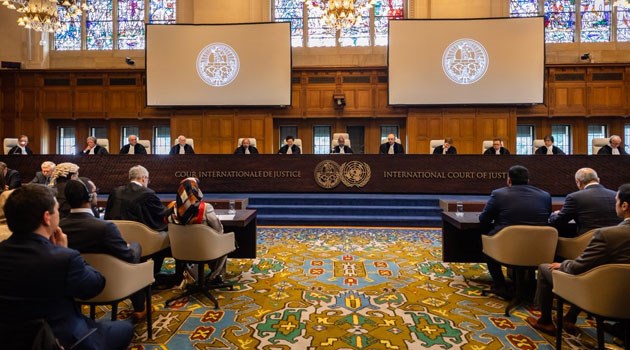
NAIROBI (HOL) – Kenya has notified the International Court of Justice that it will not participate in the maritime case against Somalia just a day before it is scheduled to begin. Kenya has cited the court’s perceived bias and its unwillingness to delay the case – for a fourth time – due to the pandemic as the main reason for withdrawing from the legal proceedings.
Kenya’s Attorney General, Paul Kihara Kariuki, notified the ICJ of the decision to pull out in a letter written on March 11 to Phillippe Gautier, the court’s registrar.”Kenya wishes to inform the court, through the Registrar, that it shall not be participating in the hearings in the case herein, should the same proceed from March 15, 2021, as presently scheduled,” the letter from Kenya’s attorney general states.”
Despite Kenya’s withdrawal, the ICJ can still proceed with the case and render a verdict since Kenya has already submitted its written arguments to the court.
Kenya, who referred to the move as “unprecedented in its history in relation to any international adjudication mechanism,” told the court that its latest legal team did not have adequate time to prepare for the case. Various Kenyan media outlets reported that top-level international lawyers were brought in to lead the maritime case in late February 2021, just weeks after the court rejected Kenya’s request to have the maritime delimitation case with Somalia postponed for the fourth time. Kenya added that the global pandemic had stripped it of financial resources to fund the case.
“The consequence of this is that Kenya and its legal team were deprived of the opportunity of having necessary preparatory meetings and engagements, ” Mr. Kariuki states.
In addition to the refusal to postpone the proceedings further, the letter to the ICJ cited further causes to justify its withdrawal from the international court.
Kenya objects to the hybrid format the hearings will be held in due to the current COVID pandemic, although some members of the court will attend the oral proceedings in person. Kenya argued that since its defence is based on demonstrations, the current format is “unsuitable for the hearing of a case as complex and as important as the present one.” The court said that the representatives of the parties involved in the case would participate either in person or by video link.
“Since the case is not urgent for any reason, Kenya least expected that the court would make this into the first cause to heard on its merits via video link, despite one party’s sustained, well-grounded objections, Kenya stated.
In building its case for withdrawal, Kenya wrote to the ICJ that one of its jurists, Abdulqawi Ahmed Yusuf, could potentially curry favour in support of Somalia. Yusuf, a Somali national was President of the Court until February this year .
“Kenya’s concerns and perception of unfairness and injustice in this matter are exacerbated by the inexplicable rejection of Kenya’s preliminary objections to this court’s jurisdiction and the dismissal of the request for the recusal of Judge Abdulqawi Ahmed Yusuf, given his past exposure, on behalf of Somalia, o the issues in this case. This is notwithstanding the fact that Kenya has taken extensive measures that are illustrative of its good faith and seriousness in defending this case, including by filing pleadings within the timelines directed by the court.”
Somalia launched legal proceedings against Kenya at the international court based in The Hague in August 2014 after talks with Kenya failed to settle the dispute. The case has fuelled the diplomatic fallout between the two East African neighbours.
Somalia dispatched its team led by Deputy Prime Minister Mahdi Guled last week. Guled expressed confidence that his country was winning the case.
“Our duty is to unite and defend our land and our real estate, which is a historic responsibility and the most precious legacy we will leave to future generations of Somalis,” said the deputy prime Minister before departing from Mogadishu.
The ICJ is tasked with deciding who has jurisdiction over the 62,000 square-mile triangle in the Indian Ocean, which is believed to be rich in hydrocarbons. Neither party can appeal the decision. The court will then rely on the UN Security Council, of which Kenya is a non-permanent member, to enforce the ruling.
U.S. Senate Resolution on Ethiopia
Source: US Senate, March 9 2021 Tuesday, March 9, 2021
U.S. Senate Resolution on Ethiopia
The U.S. Senate has introduced a bipartisan resolution calling on the government of Ethiopia, the TPLF, and other belligerents to cease all hostilities, protect human rights, allow unfettered humanitarian access, and cooperate with independent investigations of credible atrocity allegations pertaining to the conflict in Tigray Region of Ethiopia.0 commentsLabels: Abiy Ahmed, AU, elections, ENDF, Eritrea, Ethiopia, human rights, humanitarian access, IDPs, national dialogue, refugees, Sudan, Tigray Region, TPLF, UN, US, US Senate, WFP
Gulf State Interaction with the Horn of Africa
Gulf State Interaction with the Horn of Africa
Source: The International Crisis Group posted on 9 March 2021 a 25 minute podcast titled “The Horn: What Does Reconciliation among Gulf States Mean for Africa?” with Alan Boswell and Elham Fakhro, the Crisis Group’s senior analyst for Gulf States.
The January 2021 al-Ula declaration ends the blockade of Qatar and promises an end to the rift between them. The question is whether it will lead to a de-escalation of their rivalries in the Horn of Africa and elsewhere. Fakhro suggests the agreement does not resolve the underlying disagreements among the Gulf States but will help restore the mechanisms for resolving disputes.
commentsLabels: agriculture, Egypt, Eritrea, Ethiopia, foreign policy, Gulf States, Horn of Africa, Iran, Muslim Brotherhood, Qatar, Saudi Arabia, Somalia, Sudan, Turkey, UAE, US, Yemen
‘Somali political tension fuels humanitarian crisis’
‘Somali political tension fuels humanitarian crisis’




Source: Anadolu Agency, Wednesday March 10, 2021
Armed conflict remains major concern in Horn of Africa country, says UN office
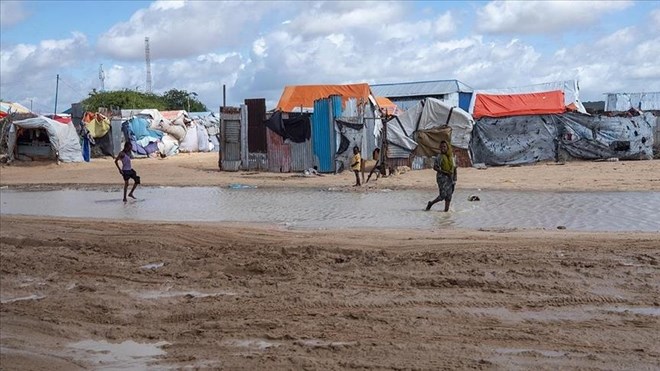
The current political tension in Somalia threatens to exacerbate the country’s humanitarian crisis, the UN Office for Coordination of Humanitarian Affairs (OCHA) warned Tuesday.
“Ongoing political tensions in Somalia will escalate the humanitarian crisis and negatively affect response operations,” OCHA Somalia tweeted.“Armed conflict remains a major concern in Somalia. Violence costs lives, disrupts livelihoods and displaces families,” it said, adding that civilians suffering from the conflict “must be protected.”
The Horn of Africa country hit a political stalemate after presidential and parliamentary elections were delayed and the president’s constitutional mandate expired on Feb. 8.
Recent clashes between government forces and opposition protesters have claimed the lives of at least four people, including soldiers.
Somali President Mohamed Abdullah Mohamed has called on regional leaders to hold talks to end the political deadlock.
Biden administration temporarily suspends drone strikes outside of war zones
Biden administration temporarily suspends drone strikes outside of war zones




Source: Middle East Eye, Wednesday March 10, 2021
Pentagon says any strikes planned outside of Afghanistan, Syria or Iraq will have to be approved by the White House
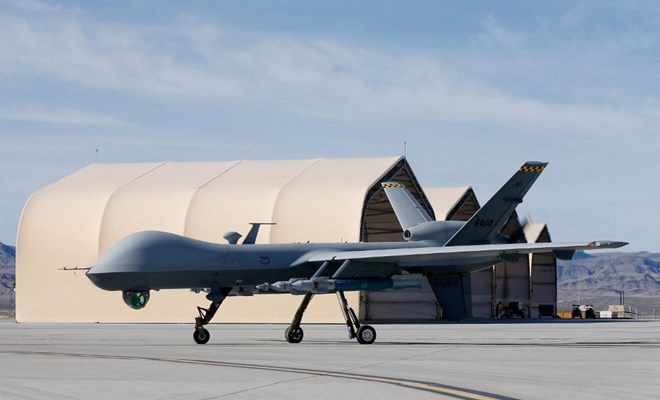
During his time in office, former President Donald Trump rolled back a number of limits on the use of drone strikes (AFP/File photo)
US President Joe Biden has temporarily suspended the use of drone strikes outside of war zones where American forces are operating, reversing a Trump-era policy that had given the military and CIA greater authority in countries such as Somalia and Yemen.
Any drone strikes planned against militant groups outside of Afghanistan, Syria or Iraq will have to be approved by the White House, Pentagon spokesman John Kirby said on Monday.
He described the measure as an “interim guidance” that was issued “to ensure that the president has full visibility on proposed significant actions””It’s not meant to be permanent and it doesn’t mean a cessation” of strikes, he told a news conference.
“We are clearly focused on the persistent threat of violent extremist organisations. And we’re clearly still going to be committed to working with international partners to counter those threats,” he said.
During his time in office, Donald Trump had rolled back a number of limits on the use of drone strikes, including a rule that required US intelligence officials to report how many civilians were killed in a drone strike outside of a war zone.
Drone strikes quickly multiplied after that, becoming the only form of operations in some countries where only a handful of US special forces were deployed in support of local governments, such as in Somalia, where the US has been battling the al-Shebab Islamist group, or in Libya, where they have targeted Islamic State (IS).
Human rights groups criticised the move at the time, saying that the lack of transparency could “lead to an increase in unlawful killings and in civilian casualties”.
In January, 34 relatives of Yemenis alleged to have been killed in US operations, including six drone strikes, filed a petition to an international human rights body in order to determine whether the deaths were unlawful.
Reviewing military strike policy
The number of US air strikes, including drone strikes, conducted in Somalia had more than doubled in Trump’s first year of office in 2017, according to the Bureau of Investigative Journalism. In Yemen, the number of US strikes more than tripled that year.
The New York Times reported on the new guidelines last week, citing unnamed officials. The newspaper said that they had been secretly passed on to military commanders after Biden came to office on 20 January, but were only revealed in recent days.
The Times said that the administration’s review of its drone strike policy was still in its early stages and officials were currently gathering data, such as official estimates of civilian casualties in both military and CIA strikes outside of war zones during Trump’s time in office.
It also said the White House was assessing whether to restore an order requiring the government to disclose how many civilians were killed in strikes each year, which was invoked by former President Barack Obama in 2016 but revoked by Trump in 2019.
The CIA does not publish data on its strikes, while the military does.
During her confirmation hearing in January, Director of National Intelligence Avril Haines said she would advocate for a new order that would report “on strikes taken by and civilian casualties caused by all US government agencies”.
Biden has also signalled a willingness to repeal the Authorisation for Use of Military Force (AUMF) measures that Congress passed hastily after the 9/11 attacks, which allowed the White House to authorise military strikes without congressional approval.
Somali diplomat named IGAD spokesman
Somali diplomat named IGAD spokesman




Source: The EastFrican, Thursday March 11, 2021
By AGGREY MUTAMBO
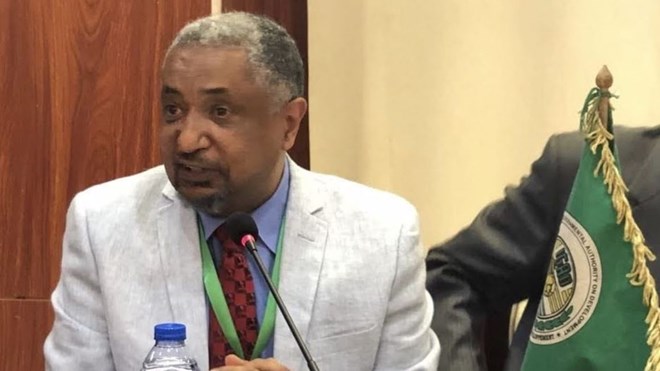
Nuur Mohamud Sheekh during a past event. PHOTO | POOL
Somali diplomat Nuur Mohamud Sheekh has been named the spokesperson for the regional bloc Intergovernmental Authority on Development (Igad).
Mr Sheekh will be the official spokesman for the Igad Secretary-General Workneh Gebeyehu and the eight-member organisation.
Dr Workneh said in a statement that the decision to appoint Mr Sheekh followed his shown ability to build links between Igad and other organisations as well as “strengthening collaborations” with member governments.“Nuur’s professional career has seen him engage with the full spectrum of policy and practice interventions at sub-national, national and regional levels with leading multilateral organisations,” Dr Workneh said on Tuesday, referring to Igad’s partners including the African Union, European Union and United Nations.
Mr Sheekh, 51, holds an advanced degree in Conflict and Development from the School of Oriental and African Studies of the University of London. He has been in the diplomatic field for three decades. The brief profile provided by Igad said he has served as a diplomat, mediator, campaigner for refugees and humanitarian worker.
Before his appointment, he worked as Senior Advisor at the Office of the Igad Special Envoy for the Red Sea, Gulf of Aden and Somalia. The bloc seeks to secure the waters of the Horn from security and environmental threats.
Igad member states are Kenya, Ethiopia, Djibouti, Somalia, South Sudan, Sudan and Uganda. Eritrea suspended itself in 2007 although it is still technically a member.
Launched in 1986 as a regional body mainly focused on drought resilience, Igad morphed in 1996 to tackle general problems of the Horn including conflict and political stability.
Mr Sheekh joined Igad in 2014, having arrived from the Internal Displacement Monitoring Centre based in Geneva, which promotes permanent solutions for displaced people.
In 2018, he was part of Igad’s mediation team for South Sudan and has recently helped establish the Task Force on the Red Sea and the Gulf of Aden.
Mr Sheekh had worked for various UN agencies between 2014 and 2018 including the refugee agency UNHCR and the UN Office for the Coordination of Humanitarian Affairs (UNOCHA).
Igad said it was banking on his wide diplomatic networks in the Horn to help make the organisation reachable and communicate better.
Somalia: UN, African Union offices hit in Mogadishu
Somalia: UN, African Union offices hit in Mogadishu




Source: Hiiraan Online, Tuesday March 9, 2021
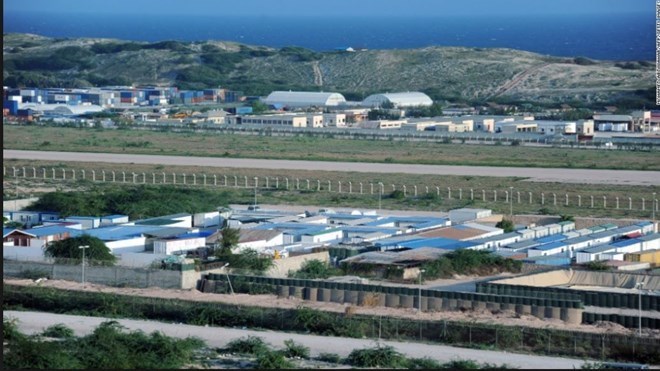
A suspected mortar attack targeted the offices of United Nations and African Union peacekeeping mission in the Somali capital Mogadishu on Tuesday.
The offices are located inside the heavily-protected Adan Adde International Airport and the compound houses several western diplomatic missions in Somalia.
sources told Anadolu Agency by phone that at least three explosions hit the compound.
However, eyewitnesses at the airport told Anadolu Agency by phone they heard over five explosions in and around the airport.
There are still no reports of casualties as investigation is underway.
Somali-based terror group al-Shabaab has claimed responsibility for the attack. The group had targeted the UN compound several times in the recent past.
International Women’s Day marked with increased hardships for women
International Women’s Day marked with increased hardships for women




Source: Monday March 8, 2021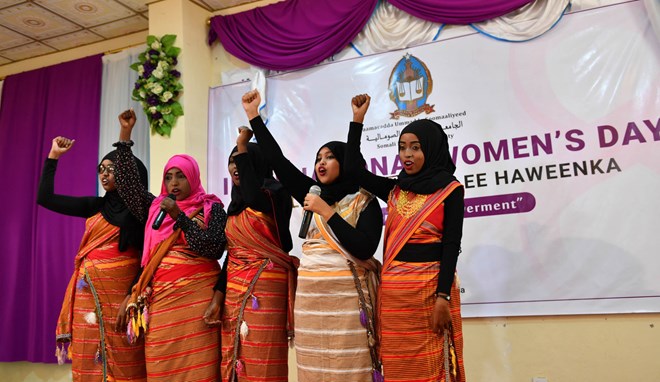
Photo/ UNSOM
For more than 100 years, International Women’s Day has been celebrated by honoring the achievements of women globally.
But this year, because of lost jobs and increased burdens of care at home, women have fared worse economically than men.
According to data from the International Labour Organization, a United Nations agency, globally women have suffered more job losses related to the pandemic than men. About 5% of women in 2020 lost work, which could mean losing a job or experiencing reduced hours, compared with 3.9% of men.
“Every time something happens in the world, women are hit with twice the violence,” Anchia Mulima, coordinator of Lemusica, an organization supporting women and girls in Mozambique, told VOA. Throughout the pandemic, the United Nations has highlighted the disparities between how women have been affected by the crisis compared with men.
“Gender inequalities have increased dramatically in the past year, as women bear the brunt of school closures and working from home,” U.N. Secretary-General Antonio Guterres said.
According to U.N. Women, 58% of employed women globally work in “informal employment,” or jobs without much regulation and often without taxes or benefits. Women are also more likely to work in industries hardest hit by the pandemic, such as hospitality and child care.
In the United States, Black and Latinx women faced more layoffs in 2020 and have seen slower gains in recent months than their white counterparts.
According to data from the U.S. Bureau of Labor Statistics (BLS), 8.9% of Black women and 8.5% of Latinx women were unemployed in February — compared with 5.2% of white women.
“It’s easy for us to make general sweeping statements of COVID-19 is affecting women in the workplace, but it’s affecting different groups of women disproportionately,” Minda Harts, an author and advocate for Black women in the workplace, told VOA.
“Hospitality, leisure — some of those industries have a very high concentration of Black and brown women. And so in 2020, we realized that a lot of those industries were heavily affected,” Harts said.
Even as women around the world have faced economic challenges, higher unemployment, and the burden of child care as schools close, they have found ways to use their skills and inspire others.
Nubia Rocío Gaona Cárdenas, a farmer in Colombia, said it broke her heart to see mothers struggling to feed their children in the capital of Bogota. She and her son had an idea.
“My son told me, ‘Mom, let’s do something productive. Some YouTube channels … don’t teach anything, let’s teach them how to farm, or teach them something. Let’s give them hope,’” Cárdenas told VOA.
Their channel on YouTube, which they launched in April 2020, now has more than 700,000 followers.
Across the globe, women working as tailors and seamstresses answered the surge in demand for face masks to curb the spread of the coronavirus.
“We believe that women are strong and can make a change. We too have abilities and can work alongside men,” Niga Mohammed, an Iraqi tailor, told VOA.
With so much work shifted to remote employees, Harts sees an opportunity for industries to diversify their workforce.
“I do believe there will be a lot more opportunities for Black and brown women to work at the high-tech companies, to work at the Fortune 500 companies from rural places that they might live, or from certain areas where they just don’t have the capacity to up and move to a big city,” she said.
But as numbers from the BLS indicate from the past few months, those changes may be slow to arrive.
This year, the theme of International Women’s Day is “Choose to Challenge.”
“A challenged world is an alert world. And from challenge comes change,” according to the International Women’s Day website.
For many women around the world amid the pandemic, the immediate challenge may be staying afloat economically.
Egypt and Sudan Team Up to Put Pressure on Ethiopia
Egypt and Sudan Team Up to Put Pressure on Ethiopia
Source: Ahramonline posted on 6 March 2021 an article titled “Egypt, Sudan Reject Ethiopia’s Unilateral Announcement to Start Second GERD Filling with or without Deal” by Amr Kandil.
Egypt’s President Abdel-Fattah El-Sisi has just completed a visit to Khartoum where he met with Sudan’s head of the Sudanese Transitional Sovereign Council, Abdel Fattah Al-Burhan, Prime Minister Abdalla Hamdok, and Vice President of the Sovereign Council, Mohamed Hamdan Dagalo. They agreed on an approach for resuming negotiations with Ethiopia to resolve issues surrounding the Grand Ethiopian Renaissance Dam. 0 commentsLabels: Abdalla Hamdok, Abdel Fattah al-Burhan, Abdel Fattah al-Sisi, AU, Blue Nile, Egypt, Ethiopia, EU, GERD, military cooperation, Nile waters, Sudan, UN, US
Somalia Fears New US Airstrike Guidance Is Benefiting al-Shabab
Somalia Fears New US Airstrike Guidance Is Benefiting al-Shabab




Source: By Harun Maruf, Jeff Seldin
Sunday March 7, 2021

A soldier walks past rubble in the aftermath of an attack on the Afrik Hotel in Mogadishu, Somalia, Feb. 1, 2021. Al-Shabab claimed responsibility for the deadly assault.
A key U.S. partner in the fight against terrorism is growing increasingly uneasy about the Biden administration’s new guidance on the use of drones and airstrikes, concerned that the changes are giving an already emboldened al-Qaida affiliate more room to operate.Ads By Googlehttps://googleads.g.doubleclick.net/pagead/ads?gdpr=1&us_privacy=1—&gdpr_consent=CPCmb8MPCmb8MAKAXAENBQCsAP_AAH_AAAwIHhNf_X_fb39j-_59_9t0eY1f9_7_v-0zjhfds-8N2f_X_L8X42M7vF36pq4KuR4Eu3LBIQFlHOHUTUmw6okVrTPsak2Mr7NKJ7LEinMbe2dYGHtfn91TuZKYr_7s_9_z__-__v__79f_r-3_3_vp9X—_e_V399xLsDwACTDUvgIsxLHAkmjSqFECEK4kOgFABRQjC0TWEDK4KdlcBHqCBgAgNQEYEQIMQUYsAgAAAgCSiICQA8EAiAIgEAAIAVICEABEwCCwAsDAIABQDQsQIoAhAkIMjgqOUwICJFooJ5KwBKLvYwwhDKLACgUf0VGAiUIIAA.YAAAAAAAAAAA&client=ca-pub-9082264144657552&output=html&h=250&slotname=6298317916&adk=2864383885&adf=373650404&pi=t.ma~as.6298317916&w=300&lmt=1615133156&url=https%3A%2F%2Fwww.hiiraan.com%2Fnews4%2F2021%2FMar%2F181890%2Fsomalia_fears_new_us_airstrike_guidance_is_benefiting_al_shabab.aspx%3Futm_source%3Dhiiraan%26utm_medium%3DSomaliNewsUpdateFront&flash=0&wgl=1&uach=WyJXaW5kb3dzIiwiNi4xIiwieDg2IiwiIiwiODguMC40MzI0LjE5MCIsW11d&dt=1615133155558&bpp=9&bdt=413&idt=41&shv=r20210303&cbv=r20190131&ptt=5&saldr=sa&abxe=1&cookie=ID%3D464f92001a5384d6%3AT%3D1615046929%3AS%3DALNI_MbsyXaUrG5IWokyDOgzY6egi5cEQQ&prev_slotnames=5984921620&correlator=5013843224024&frm=20&pv=1&ga_vid=312678215.1532946768&ga_sid=1615133156&ga_hid=1927465308&ga_fc=1&u_tz=60&u_his=4&u_java=0&u_h=1080&u_w=1920&u_ah=1040&u_aw=1920&u_cd=24&u_nplug=3&u_nmime=4&adx=977&ady=997&biw=1903&bih=969&scr_x=0&scr_y=0&eid=182982100%2C182982300%2C21066922%2C21068495%2C21065725&oid=3&pvsid=331102825085953&pem=88&ref=https%3A%2F%2Fwww.hiiraan.com%2F&rx=0&eae=0&fc=640&brdim=0%2C0%2C0%2C0%2C1920%2C0%2C1920%2C1040%2C1920%2C969&vis=1&rsz=%7C%7CeEbr%7C&abl=CS&pfx=0&fu=8192&bc=31&ifi=2&uci=a!2&btvi=1&fsb=1&xpc=QTw4WzLxAR&p=https%3A//www.hiiraan.com&dtd=759Since U.S. President Joe Biden took office January 20, the United States has not launched a single airstrike against al-Shabab in Somalia, after seven strikes were conducted from January 1 to 19.
Senior Somali military officials worry the new guidance, which has imposed tighter controls on ordering airstrikes and requires the White House to sign off on operations, means al-Shabab will begin to gather momentum.
“Lack of strikes mean al-Shabab leaders will come out of hiding,” a senior Somali military commander, who spoke on condition of anonymity because he was not authorized to talk about the issue publicly, told VOA’s Somali Service.
“They will bring their battle wagons out. They will mount big guns on top of vehicles again. They will start to gather in large numbers again,” he said. “It will be detrimental not only to the security of Somalia but to the region if al-Shabab were given freedom to move around.”

Grave threat
U.S. defense and intelligence officials have long considered the Somalia-based al-Shabab one of the gravest threats emanating from Africa, targeting the group with 53 airstrikes in 2020 and 63 airstrikes in 2019.
The impact, though, has been debatable.
Recent U.S. intelligence estimates indicate al-Shabab commands as many as 10,000 fighters across Somalia and parts of Kenya. And despite consistent counterterrorism pressure, officials concluded by the latter half of 2020 that the group was starting to show it was operating without fear.
“The terrorist threat in East Africa is not degraded,” the U.S. Department of Defense inspector general warned in a November report. “Al-Shabab retains freedom of movement in many parts of southern Somalia and has demonstrated an ability and intent to attack outside of the country, including targeting U.S. interests.”
Intelligence gathered by U.N. member states, and included in a report last month, raised further concerns about al-Shabab’s ability to attack in major towns and along key transportation corridors.
The report also noted what it said was a “remarkable increase in al-Shabab propaganda and in the group’s online presence to enhance recruitment and radicalization.”
NEW: #alQaida & affiliates enduring “a period of high leadership attrition” warns a new @UN terrorism report
AQ suffering “multiple losses in #Afghanistan, #Mali, #Somalia, #Yemen & the Governate of #Idlib in the #Syria|n Arab Republic”per member state intelligence https://t.co/uFXJzTQDdb— Jeff Seldin (@jseldin) February 5, 2021
Those trends are what have Somali officials feeling ever more uneasy, especially given developments on the ground.
“In the current political situation, where our security forces are diverted to electoral security and political tasks, this is again a boon to al-Shabab,” said Samira Gaid, who served as a senior security adviser to former Somali Prime Minister Hassan Ali Khaire.
“The airstrikes changed their tactics and operation and kept pressure on them when Somali forces and AMISOM [the African Union Mission in Somalia] are not conducting regular operations,” she said.
The Biden administration’s limits on U.S. counterterrorism strikes, first reported earlier this month by The New York Times, are part of a larger review of the existing “legal and policy frameworks” governing such actions.
“The purpose of the interim guidance is to ensure the president has full visibility on proposed significant actions,” according to National Security Council spokeswoman Emily Horne. She said it would be “premature to anticipate” when the review would conclude.
Review understood
Current and former Somali security officials indicate they understand the new administration’s reasoning for the review. They just fear that the interim guidance is putting them and the U.S. at a disadvantage.
“Of course, the operations should be conducted with the utmost care and should protect civilians,” Gaid said. “But the reality is, the group [al-Shabab] needs to be on the defensive and should not have freedom of movement and operations, and that’s what the airstrikes helped with.”
The extent to which those concerns have made it up the Somali chain of command and have been communicated to U.S. officials is unclear.
In a statement on civilian casualties Friday, U.S. Africa Command acknowledged Somali defense officials have said airstrikes are a critical part of the effort against al-Shabab.
“The Somali National Army fully supports U.S. Africa Command’s efforts to degrade al-Shabab through kinetic airstrikes,” the statement quoted Somali Chief of Defense Forces Brigadier General Odawa Yusuf Raage as telling U.S. officials at a recent meeting.
“These strikes are a key part in our fight against an enemy that has shown no hesitation in terrorizing innocent Somali citizens through repression, extortion and murder,” Raage said.
Pentagon spokesman John Kirby speaks to reporters Feb. 17, 2021.
But the Pentagon said Friday that if there has been any concern about the Biden administration’s tightening of control on airstrikes, that has not been shared.
“I’m not aware of any such concerns that have been expressed to the department,” spokesman John Kirby told reporters.
U.S. Africa Command, when asked directly about the Somali concerns, told VOA it “remains confident” it can provide its Somali partners with the necessary support to contain al-Shabab.
“Airstrikes are only one of the tools available to counter the threat,” said Africa Command spokesman Colonel Chris Karns. “It won’t always be the first or best option for a given scenario.”
Pressure in ‘various forms’
“Pressure will persist, but this pressure will occur in various forms and by various partners,” he added.
As part of the ongoing effort to bolster Somalia’s campaign against al-Shabab, U.S. Africa Command pointed to training it conducted for the country’s elite Danab counterterrorism forces and an emergency response exercise in Mogadishu in January.
“Our mission has not changed,” Major General Dagvin Anderson, the commander of Special Operations Command Africa, said in a statement at the time. “We remain committed to our Somali and regional partners and support their fight against violent extremism.”
However, unlike some previous training missions and exercises, U.S. forces had to deploy to Somalia in January to work with the Somali forces after Africa Command relocated 700 troops from the country at the direction of then-President Donald Trump.And that came after the Defense Department inspector general raised concerns that Somalia’s security forces were not yet ready to take the lead in the effort to contain al-Shabab.
“While these sub-national forces conduct offensive operations against #alShabaab and #ISIS-Somalia, they often do not coordinate activity with each other and sometimes work at cross purposes” per @DoD_IG— Jeff Seldin (@jseldin) November 25, 2020
Somalia’s security forces “continue to rely on international support,” the inspector general warned in November. “Al-Shabab is not degraded to the point where Somali security forces can contain its threat independently.”
VOA’s Somali Service contributed to this report.
Proportion of women parliamentarians worldwide reaches ‘all-time high’
Proportion of women parliamentarians worldwide reaches ‘all-time high’
Source: UN News center, 5 March 2021Women

UN Photo/Eric KanalsteinWomen parliamentarians of the Afghan Lower House (Wolesi Jirga or “House of the People”) arrive at their inauguration ceremony in Kabul (2001). 5 March 2021Women
The proportion of women parliamentarians worldwide reached more than 25 per cent last year– a historic first but still far from gender parity, UN partner the Inter-Parliamentary Union (IPU) announced on Friday ahead of International Women’s Day on 8 March.
“It gives me great pleasure to announce that for the first time, women now account for more than a quarter of parliamentarians worldwide”, IPU Secretary-General Martin Chungong said in launching its latest Women in Parliament report at the UN Office in Geneva. “The global average of women in parliament has now reached 25.5 per cent.”
Gender parity 50 years away
The IPU, the global organization of national parliaments, has tracked women’s participation in parliament for decades, allowing it to measure progress and setbacks.
“While we celebrate and welcome this all-time high, we feel that progress is painstakingly, or even excruciatingly, slow”, Mr. Chungong said. “At the current rate, it will take another 50 years before we can achieve gender parity in parliament. And of course, we all agree that this is not tenable, it’s not acceptable”.
Following elections in 2020, the global proportion of women in parliament increased by 0.6 points when compared with the previous year.
The IPU chief singled out Rwanda, Cuba and the United Arab Emirates for having achieved gender parity, with women accounting for 50 per cent or more parliamentary seats.
Referring to Rwanda as a role model for women’s participation in government, Mr. Chungong said “we have seen evidence that where countries have come out of conflict and have had the opportunity to re-found the foundations of society, the legal framework of society, there is a greater chance of promoting gender equality, because this is something that has been articulated at the international level and it’s an opportunity for the society as a whole to sit down and say ‘this is what we want in the constitution’”.
Gender quotas key
The IPU advocates for well-designed quotas as the key to progress, as evidenced by elections held in 2020. Electoral gender quotas were applied in 25 of the 57 countries that had parliamentary renewals last year. On average, parliaments with quotas elected nearly 12 per cent more women to single and lower chambers, and 7.4 per cent more women to upper chambers.
“Where women are involved in lawmaking on specific issues, the outcomes are better in terms of health care, in terms of the way even parliaments are functioning, making parliaments more gender sensitive”, said the IPU Secretary-General.
Americas on top
Though progress was reported in all regions, the Americas were again on top in 2020, with women making up 32.4 per cent of MPs. In Chile, Colombia and Ecuador, the percentage is higher than average.
In Sub-Saharan Africa, Mali and Niger made significant gains in women’s representation, despite security challenges. The IPU said these countries are testament to the fact that women’s role in transition processes is key to their political empowerment.
The proportion of women in parliament is lowest in the Middle East and North Africa region, with 17.8 per cent on average.
With the exception of New Zealand, the number of women MPs in the Pacific remained consistently low or entirely absent in 2020.
Pandemic postpones elections
The “Women in Parliament” report shows that the COVID-19 pandemic also influenced elections and campaigning last year.
“The COVID pandemic has had a negative impact on elections, in some countries those elections were postponed”, Mr. Chungong said. “In others, in some 50 countries where elections took place, we saw that women faced all manners of impediments as a result of the pandemic that exacerbated existing gender imbalances in politics”.
The IPU said online violence against women has become even more widespread, threatening women’s participation in public life. However, the shift to remote, technology-driven parliamentary practices may have a potentially positive long-term impact for women in parliament.
Somalia: Impediments to Good Governance
Somalia: Impediments to Good Governance
Source: The Heritage Institute for Policy Studies published in March 2021 a study titled “Impediments to Good Governance in Somalia” by lead author Abdirizak A. Muhumed.
The study concludes that the unwillingness of national stakeholders or their inability to build and work within autonomous and functioning public institutions, coupled with the 4.5 political formula, perpetuate Somalia’s underperformance in all indicators of good governance. The study assesses the impediments to good governance in Somalia. 0 commentsLabels: corruption, governance, history, rule of law, Somalia
Turkey hands over military barracks to Somalia
Turkey hands over military barracks to Somalia



Yenisafak
Source: Yenisafak, Saturday March 6, 2021

Turkey on Saturday handed over military barracks to Somalia, according to an official statement.
“As part of restructuring the Somali Armed Forces, the Northern Barracks – 1st Stage Facilities built by Turkey in Mogadishu were handed over to the [Somali] authorities,” Turkey’s National Defense Ministry said on Twitter.
yip Erdogan’s official visit in 2011, making him the only non-African leader to visit Somalia in 20 years.
Besides military cooperation, the two countries also partner on health, education, and other initiatives.
Turkey has built schools, hospitals and infrastructure, and has provided Somalis with scholarships to study in Turkey.
UN Human Rights Chief Suggests War Crimes in Ethiopia’s Tigray Region
UN Human Rights Chief Suggests War Crimes in Ethiopia’s Tigray Region
Source: CNN published on 4 March 2021 an article titled “UN Rights Chief Says War Crimes May Have Been Committed in Ethiopia after CNN Reveals Tigray Massacre” by Niamh Kennedy.
Michelle Bachelet, the UN’s high commissioner for human rights, says that war crimes and crimes against humanity may have been committed by multiple actors in Tigray Region, including the Ethiopian National Defense Forces, the Tigray People’s Liberation Front, Eritrean armed forces, and Amhara Regional Forces and affiliated militia. 0 commentsLabels: Abiy Ahmed, Amhara militia, ENDF, Eritrea, Ethiopia, gender-based violence, human rights, Tigray Region, TPLF, UN, war crimes
Biden secretly limits drone strikes, amid congressional scrutiny over war powers
Biden secretly limits drone strikes, amid congressional scrutiny over war powers




Source: Independent, By Josh Marcus
Friday March 5, 2021
Obama administration greatly expanded the use of drone strikes before later imposing checks

A US MQ-9 Reaper drone taxis at Kandahar Airfield, Afghanistan, in December 2009.(U.S. Air Force photo/Tech. Sgt. Efren Lopez)
The Biden administration secretly put temporary limits on the use of drone strikes and commando raids outside of traditional battlefield settings like Afghanistan or Syria, part of a larger national security review of whether to alter use of force rules from the Trump administration.
The changes, which the administration put in place on Mr Biden’s first day in office, were first reported on Wednesday by the New York Times, and come as the Biden administration recalibrates the sprawling US footprint across the Middle East, and Congress pushes to rein in the president’s war-fighting powers and scrutinises a recent strike in Syria.
Under the temporary freeze, the military and CIA need direct White House permission to attack terrorism suspects outside of regular US battlefields, and will apply in places like Yemen and Somalia. Under the Trump administration, officials within these branches were left to decide for themselves when to carry out such strikes.Greater data transparency on killings and civilian deaths, as well new standards on avoiding civilian casualties, are among the changes being considered as part of the broader review.
“This review includes an examination of previous approaches in the context of evolving counterterrorism threats in order to refine our approach going forward,”Emily Horne, spokeswoman for national security council, told the Times. “In addition, the review will seek to ensure appropriate transparency measures.”
The US has been using drones and special forces raids under four different administrations in the the two decades following the 9/11 attacks, going so far as to kill US citizen Anwar al-Awlaki, a radical cleric, in Yemen in 2011.
The Obama administration, where Mr Biden was vice-president, greatly expanded the use of drone strikes, before later imposing various checks on the practice, such as a 2013 requirement targets are a “continuing and imminent threat” to Americans, and a 2016 policy about disclosing fatality and civilian casualty numbers to the public, both policies which the Trump administration scrapped.
The Biden administration’s war policy actions have been met with scepticism so far from rights groups and the president’s liberal allies.
“President Biden promised to end forever wars, but tinkering with the bureaucracy of this extrajudicial killing program will only entrench American abuses,” Hina Shamsi, director of the American Civil Liberties Union’s national security project, said in a statement. “In the name of counterterrorism, US presidents have for two decades authorised unlawful, secretive, and unaccountable killing abroad.”
The president has made a number of major changes so far, particularly to US policy towards the war in Yemen between a US-backed coalition of Gulf states and the Iranian-backed Houthi militia.
Mr Biden paused arms sales to Saudi Arabia, named a special envoy for the six-year conflict, and lifted a Trump administration designation of the Houthis as terrorists, in an effort to bring an end to the war, which has created one of the world’s worst humanitarian crises in its wake.
But the president hasn’t escaped scrutiny, especially following US strikes in late February against Iranian-backed militia targets in Syria, a response to previous militia attacks against US forces in Iraq that have killed and injured service members and contractors.
The strikes, made without consultation with Congress, provoked the ire of some lawmakers, as did a decision to decline to penalise Saudi Crown Prince Mohammed bin Salman for the 2018 murder of US-based journalist Jamal Khashoggi.
“Last week’s airstrikes in Syria show that the Executive Branch, regardless of party, will continue to stretch its war powers,” Virginia senator Tim Kaine, a Democrat, said in a statement this week.
He is part of a bipartisan group seeking to repeal the legal authorisations underpinning the US War on Terror, which has stretched on for 20 years, long since its original adversaries have morphed and dispersed. The proposed bill would re-emphasise Congress’ constitutionally prescribed role in declaring war.
At least 20 killed by suicide car bomb blast in Somalia
At least 20 killed by suicide car bomb blast in Somalia




Source: Aljazeera, Friday March 5, 2021
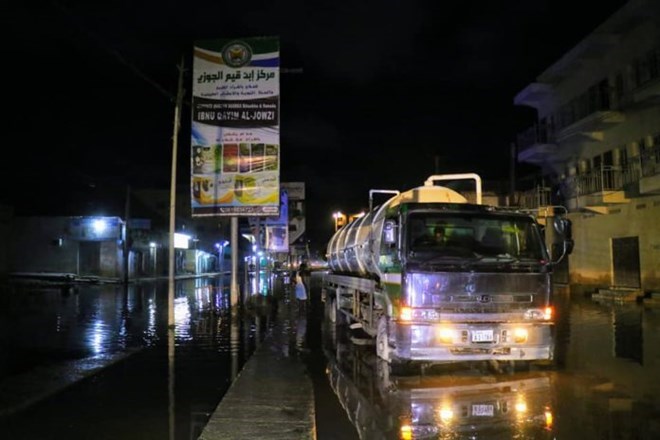
At least 20 people were killed and 30 wounded by a suicide car bomb just outside a restaurant near the port in Somalia’s capital Mogadishu late on Friday.
The blast sent plumes of smoke into the sky and triggered gunfire, witnesses and state-owned media reported.
“So far we have carried 20 dead people and 30 injured from the blast scene,” Dr Abdulkadir Aden, founder of AAMIN Ambulance services, told Reuters news agency.
The blast occurred at the Luul Yemeni restaurant near the port, witnesses said.
“A speeding car exploded at Luul Yemeni restaurant. I was going to the restaurant but ran back when the blast shook and covered the area with smoke,” said resident Ahmed Abdullahi.
Police spokesman Sadiq Ali Adan blamed the attack on the armed group al-Shabab, which is linked to al-Qaeda and often targets Mogadishu with bombings. The Luul Yemani restaurant also was attacked last year.At least one building near the restaurant collapsed after the blast and people were feared to be trapped in the rubble. The bombing occurred at dinner time when the restaurant was full.
No one claimed responsibility for the blast.
“The blast was very heavy and caused massive destruction and civilian casualties. The operation is still going on to establish the exact number of casualties,” said security officer Mohamed Osman.
Al-Shabab frequently carries out such bombings in Somalia and elsewhere as part of its campaign to topple the Horn of African country’s central government and establish its own rule based on its strict interpretation of Islamic law.
Security in Mogadishu had been especially heavy with thousands of government forces deployed in anticipation of a planned demonstration on Saturday by an alliance of opposition leaders over the country’s delayed national election. The demonstration was later postponed.
Why South Sudan Has Only Known Conflict
Why South Sudan Has Only Known Conflict
Source: World Politics Review published on 23 February 2021 a commentary titled “Why the World’s Newest Country Has Only Known Conflict” by Alan Boswell, International Crisis Group.
The author argues any hope for stability in South Sudan depends on a reset of an ill-suited winner-take-all political system that fuels ongoing tensions among elites. 0 commentsLabels: Equatoria, Ethiopia, governance, Kenya, Riek Machar, Salva Kiir, South Sudan, Sudan, Thomas Cirillo, Uganda
Atrocities in Ethiopia’s Tigray Region
Atrocities in Ethiopia’s Tigray Region
Source: U.S. Secretary of State Antony Blinken issued a statement on 27 February 2021 titled “Atrocities in Ethiopia’s Tigray Region.”
The statement begins with “the United States is gravely concerned by reported atrocities and the overall deteriorating situation in the Tigray region of Ethiopia.”
It concludes with the statement that the “United States remains committed to building an enduring partnership with the Ethiopian people.” (The bold type is mine.)
The “diplo-speak” in this final sentence is clear. The United States expects the government of Ethiopia to follow through on its promises.0 commentsLabels: Antony Blinken, AU, Eritrea, Ethiopia, humanitarian crisis, Tigray Region, UN, US, USAID
Amnesty report describes Axum massacre in Ethiopia’s Tigray
Amnesty report describes Axum massacre in Ethiopia’s Tigray




Source: AP, by Cara Anna | AP
Sunday February 28, 2021

FILE – In this Monday, Nov. 4, 2013 file photo, the Church of St. Mary of Zion in Axum, in the Tigray region of Ethiopia. A new Amnesty International report issued Friday, Feb. 26, 2021 says soldiers from Eritrea systematically killed “many hundreds” of people, the large majority men, in a massacre in late November 2020 in the Ethiopian city of Axum. (File/Associated Press)
NAIROBI, Kenya — Soldiers from Eritrea systematically killed “many hundreds” of people, the large majority men, in a massacre late November in the Ethiopian city of Axum in the Tigray region, Amnesty International said Friday. The new report echoed the findings of an Associated Press story last week and cited more than 40 witnesses.
As pressure on Ethiopia increased over what might be the deadliest massacre of the Tigray conflict, the prime minister’s office announced that “humanitarian agencies have now been provided unfettered access to aid in the region.” It added that the government “welcomes international technical assistance to undertake the investigations (into alleged abuses) as well as invites the potential to collaborate on joint investigations.”
And yet the government alleged the Amnesty report relied on “scanty information,” and said the human rights group should have visited the Tigray region. Amnesty said it requested permission from the government in December and never received a response.
“As you know, no independent human rights monitors have been allowed in the region since the conflict began,” spokesman Conor Fortune said in an email to the AP.Crucially, the head of the government-established Ethiopian Human Rights Commission, Daniel Bekele, says the Amnesty findings “should be taken very seriously.” The commission’s own preliminary findings “indicate the killing of an as yet unknown number of civilians by Eritrean soldiers” in Axum, its statement said.
The Amnesty report describes the soldiers gunning down civilians as they fled, lining up men and shooting them in the back, rounding up “hundreds, if not thousands” of men for beatings and refusing to allow those grieving to bury the dead.
Over a period of about 24 hours, “Eritrean soldiers deliberately shot civilians on the street and carried out systematic house-to-house searches, extrajudicially executing men and boys,” the report released early Friday says. “The massacre was carried out in retaliation for an earlier attack by a small number of local militiamen, joined by local residents armed with sticks and stones.”
The “mass execution” of Axum civilians by Eritrean troops may amount to crimes against humanity, the report says, and it calls for a United Nations-led international investigation and full access to Tigray for human rights groups, journalists and humanitarian workers. The region has been largely cut off since fighting began in early November.
Ethiopia’s federal government has denied the presence of soldiers from neighboring Eritrea, long an enemy of the Tigray region’s now-fugitive leaders, and Eritrea’s government dismissed the AP story on the Axum massacre as “outrageous lies.” Eritrea’s information minister, Yemane Gebremeskel, on Friday said his country “is outraged and categorically rejects the preposterous accusations” in the Amnesty report.
But even senior members of the Ethiopia-appointed interim government in Tigray have acknowledged the Eritrean soldiers’ presence and allegations of widespread looting and killing.
Ethiopia said the “alleged incident” in Axum “will have to be thoroughly investigated.”
And Ethiopia’s ambassador to Belgium, Hirut Zemene, told a webinar on Thursday that the alleged massacre in November was a “very highly unlikely scenario” and “we suspect it’s a very, very crazy idea.”
No one knows how many thousands of civilians have been killed in the conflict between Ethiopian and allied forces and those of the Tigray regional government, which had long dominated Ethiopia’s government before Prime Minister Abiy Ahmed took office in 2018. Humanitarian officials have warned that a growing number of people might be starving to death as access, while improving, remains restricted.
“Hostilities must cease immediately,” the European Union foreign policy chief Josep Borrell said in a statement in response to the Amnesty International report, adding that “the level of suffering endured by civilians, including children, is appalling.”
The presence of Eritrean soldiers in Tigray has brought some alarm. The United States has repeatedly urged Eritrea to withdraw its soldiers and cited credible reports of “grave” human rights abuses.
On Saturday, U.S. Secretary of State Antony Blinken said the United States is “gravely concerned” by reports of atrocities.
“The United States has repeatedly engaged the Ethiopian government on the importance of ending the violence, ensuring unhindered humanitarian access to Tigray, and allowing a full, independent, international investigation into all reports of human rights violations, abuses, and atrocities,” Blinken said in a statement. “Those responsible for them must be held accountable.”
Witnesses of the massacre in Axum told Amnesty International that Ethiopian and Eritrean soldiers jointly took control of the city but the Eritreans carried out the killings and then conducted house-to-house raids for men and teenage boys.
Bodies were left strewn in the streets after the events of Nov. 28 and 29, witnesses said.
“The next day, they did not allow us to pick the dead. The Eritrean soldiers said you cannot bury the dead before our dead soldiers are buried,” one woman told Amnesty International. With hospitals looted or health workers having fled, some witnesses said a number of people died from their wounds because of lack of care.
“Gathering the bodies and carrying out the funerals took days. Most of the dead appear to have been buried on 30 November, but witnesses said that people found many additional bodies in the days that followed,” the new report says.
After obtaining permission from Ethiopian soldiers to bury the dead, witnesses said they feared the killings would resume any moment, even as they piled bodies onto horse-drawn carts and took them to churches for burial, at times in mass graves.
The AP spoke with a deacon at one church, the Church of St. Mary of Zion, who said he helped count the bodies, gathered victims’ identity cards and assisted with burials. He believes some 800 people were killed that weekend around the city.
After being left exposed for a day or more, the bodies had begun to rot, further traumatizing families and those who gathered to help.
The new report says satellite imagery shows newly “disturbed soil” beside churches.

